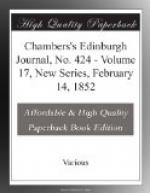Full of these thoughts, I sought out my poor lady, determined to do her real benefit if I could. She received me very kindly, for I had taken care to provide myself with a sufficient introduction, so as to set all doubts of my social position at rest: and I knew how far this would go with her. We soon became fast friends. She seemed to rest on me much for sympathy and comfort, and soon grew to regard me with a sort of motherly fondness that of itself brightened her life. I paid her all the attention which a devoted son might pay—humoured her whims, soothed her pains; but insensibly I led her mind out from itself—first in kindness to me, and then in love to her grandson.
I asked for him just before the midsummer holidays, and with great difficulty obtained an invitation for him to spend them with her. She resisted my entreaties stoutly, but at last was obliged to yield; not to me, nor to my powers of persuasion, but to the holy truth of which I was then the advocate. The child came, and I was there also to receive him, and to enforce by my presence—which I saw without vanity had great influence—a fitting reception. He was a pensive, clever, interesting little fellow; sensitive and affectionate, timid, gifted with wonderful powers, and of great beauty. There was a shy look in his eyes, which made me sure that he inherited much of his loveliness from his mother; and when we were great friends, he shewed me a small portrait of ‘poor mamma;’ and I saw at once the most striking likeness between the two. No human heart could withstand that boy, certainly not my poor friend’s. She yielded, fighting desperately against me and him, and all the powers of love, which were subduing her, but yielding while she fought; and in a short time the child had taken his proper place in her affections, which he kept to the end of her life. And she, that desolate mother, even she, with her seared soul and petrified heart, was brought to the knowledge of peace by the glorious power of love.
Prosperous, famous, happy, blessed in home and hearth, this has become my fundamental creed of life, the basis on which all good, whether of art or of morality, is rested: of art especially; for only by a tender, reverent spirit can the true meaning of his vocation be made known to the artist. All the rest is mere imitation of form, not insight into essence. And while I feel that I can live out of myself, and love others—the whole world of man—more than myself, I know that I possess the secret of happiness; ay, though my powers were suddenly blasted as by lightning, my wife and children laid in the cold grave, and my happy home desolated for ever. For I would go out into the thronged streets, and gather up the sorrows of others, to relieve them; and I would go out under the quiet sky, and look up to the Father’s throne; and I would pluck peace, as green herbs from active benevolence and contemplative adoration. Yes; love can save from the sterility of selfishness, and from the death of despair: but love alone. No other talisman has the power; pride, self-sustainment, coldness, pleasure, nothing—nothing—but that divine word of Life which is life’s soul!




